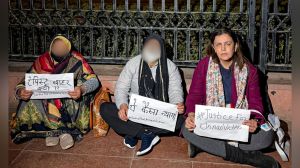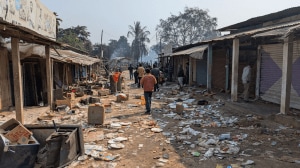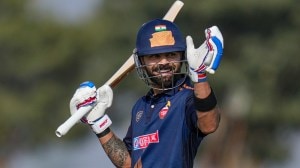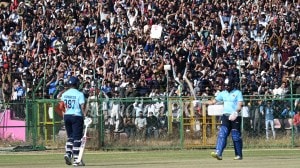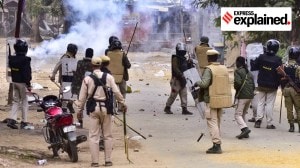Kambala comes to Bengaluru: How buffalo race’s popularity outran bans
Kambala has in the past been banned by the Supreme Court, but the Karnataka government, keeping its popularity in mind, amended legislation to allow the races to go on.
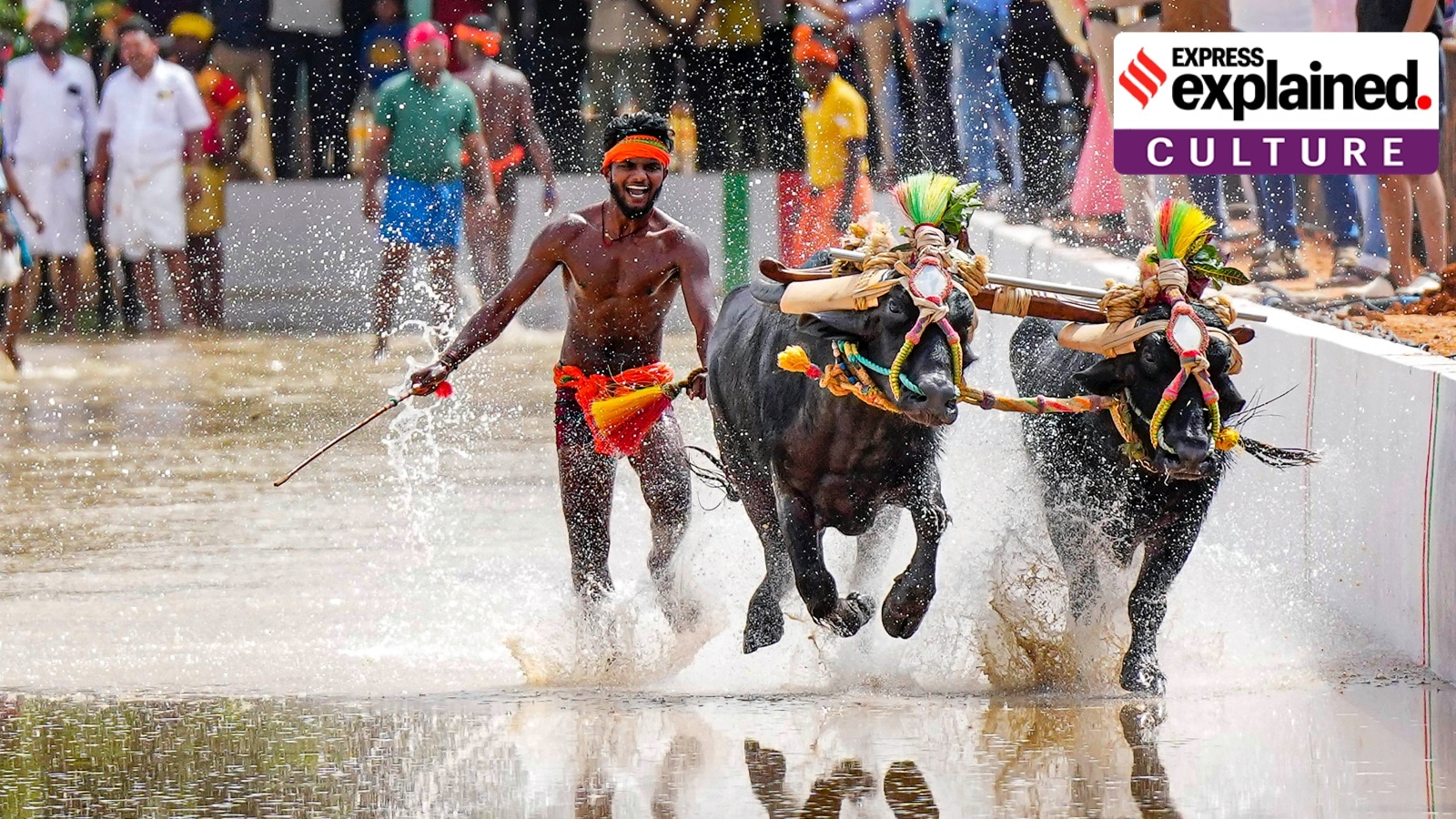 A participant with his buffalos during a trial run for the 'Bengaluru Kambala' (Buffalo race), at Palace Grounds in Bengaluru, Thursday, Nov. 23, 2023. (PTI Photo/Shailendra Bhojak)
A participant with his buffalos during a trial run for the 'Bengaluru Kambala' (Buffalo race), at Palace Grounds in Bengaluru, Thursday, Nov. 23, 2023. (PTI Photo/Shailendra Bhojak) The past weekend saw Bengaluru hold its first Kambala race, with 159 pairs of buffaloes and their jockeys racing through the specially made slush tracks in the city’s Palace Grounds. The final rounds of the races could be concluded only by 2 am on Monday.
Lakhs of people visited the venue to watch the event.
Kambala has in the past been banned by the Supreme Court, but the Karnataka government, keeping its popularity in mind, amended legislation to allow the races to go on.
What is Kambala?
It is a folk sport practised in coastal Karnataka districts, especially in regions where Tulu speakers form a majority. In the past, races were hosted by various families and groups in sludgy fields in the days after paddy was harvested. More recently, various Kambala Samithis or organising bodies have come up, which host weekly events from the end of November till the first half of April across Dakshina Kannada and Udupi districts.
Kambala is a matter of prestige for many families, especially from the Bunt community in the coastal areas. Pairs of buffaloes are groomed by them round the year in the hope of winning a Kambala event.
 A Kambala jockey races his buffaloes during the Anna-Thamma Kambala organised at Paivalike, in the Kasargod district in Kerala. (Express file photo by Nirmal Harindran)
A Kambala jockey races his buffaloes during the Anna-Thamma Kambala organised at Paivalike, in the Kasargod district in Kerala. (Express file photo by Nirmal Harindran)
What are the categories in Kambala?
Kambala is generally held under four categories. First is Negilu (plough), where light ploughs are used to tie buffaloes for the race. The event is for entry-level animals.
The second is Hagga (rope), where buffaloes are raced by jockeys with just a rope tying the pair together. The third category is Adda Halage, in which jockeys stand over a horizontal plank dragged by buffaloes. Thus, unlike Hagga and Negilu, where jockeys run behind the animals, in this, buffaloes drag the jockeys.
Kane Halage is the fourth category, where a wooden plank is tied to buffaloes. The plank, on which the jockeys stand, has two holes through which water gushes out as the plank is dragged along the slush tracks. The height to which water splashes determines the winner of the event.
Is Kambala popular across Karnataka?
Though the popularity of the races is restricted to coastal Karnataka, the Bengaluru organisers believe that movies like ‘Kanthara’ have given the event a pan-Karnataka appeal. Due to the success of the movie, many people are interested in learning more about the folk sport, Puttur MLA Ashok Rai, one of the main organisers of the event, said.
To ensure that more teams participated in the Kambala at the state’s capital, an incentive of Rs 50,000 was offered to bring the buffaloes to Bengaluru for the event.
 Kambala jockey Srinivas Gowda taking care of his buffaloes, along with the owner Harsh Vardhan Padhwal, at their village in Mudibidri, Karnataka, before the race. (Express file photo by Nirmal Harindran)
Kambala jockey Srinivas Gowda taking care of his buffaloes, along with the owner Harsh Vardhan Padhwal, at their village in Mudibidri, Karnataka, before the race. (Express file photo by Nirmal Harindran)
Why was Kambala outlawed by the Supreme Court?
Several organisations, including People for the Ethical Treatment of Animals (PETA), had filed a petition against all traditional sporting events, complaining about animal abuse.
The complaint against Kambala was that the buffaloes’ noses are tied with a rope and the animals are whipped continuously during the race, which amounts to cruelty. The SC, which heard these petitions, ruled to ban Jallikattu, Kambala and bullock cart racing in 2014.
How was the ban lifted?
In January 2016, the Environment Ministry issued a notification where an exception was made, saying “bulls might be continued to be trained as performing animals at events such as Jallikattu in Tamil Nadu and Bullock Cart Races in Maharashtra, Karnataka, Punjab, Haryana, Kerala and Gujarat in the manner…or practice traditionally under the customs or as part of culture in any part of the country.” This exception was made subject to certain conditions aimed at reducing the suffering of the animals being used for such sports.
At the same time, state governments amended provisions of the Prevention of Cruelty to Animals Act to provide an exemption for these events. Though this was challenged, a five-judge Constitutional Bench upheld the amendments made by Karnataka, Tamil Nadu, and Maharashtra in May this year.
Why has Kambala been accused of caste discrimination?
Historically, members of the Koraga community, once considered “untouchable”, were ill-treated before the festival kicked off, with some even made to race instead of the buffaloes. Today too, critics argue, the sport is controlled by dominant caste groups while those considered “lower caste” end up doing menial jobs during the event.
- 01
- 02
- 03
- 04
- 05












